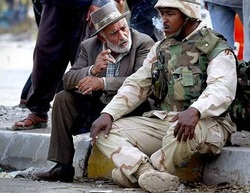YEAH IRAQ IT'Z FRIDAY A chronic political paralysis in Iraq Keeping national partnerships aside, those who get more votes in the elections ought to be given a chance to run the country By Mohammad Akif Jamal, Special to Gulf News Published: 00:00 October 20, 2012 When Iraqi President Jalal Talabani left for Germany last April on a therapeutic journey, the Iraqi political crisis was at its peak. However, upon his return to the country after four months, the crisis remained as it was — as though it was waiting for the president’s return. The president has recovered, but the Iraqi political crisis remains a problem for all Iraqis. The no-confidence vote against Prime Minister Nouri Al Maliki is no more an issue in Iraq; neither is calling him for accountability by the parliament. Talk, however, has resumed about reforms and the National Assembly, which was called for by the President of Iraq before his departure and after the Iraqi political crisis started at the Erbil summit, then Najaf, then in Erbil once more between the Kurdish Province President, the Chairman of the Al Iraqia Coalition and the Chairman of the Sadrist Movement. Article continues below Media outlets have circulated news about a reform doctrine that is being prepared by a committee from the National Alliance presided by former prime minister Ebrahim Al Jafari, though some parties inside the alliance are denying the existence of such a paper. So what will be discussed inside the new National Assembly? And what points will be accepted? The concept of reforms does not mean amending the constitutional structure, which is being demanded now. However, it reflects the re-distribution of interests, authorities and the area of participation in decision-making between political blocs. Frankly, this is unlikely to happen as it will be at the expense of the vast authorities enjoyed by the prime minister himself. Moreover, it will neither suit the prime minister nor the national alliance he belongs to, because Al Maliki is in a stronger position than his opponents. He succeeded in aborting all efforts to topple his government and consequently the attack against him subsided, despite the fact that the roots of discontent are still alive. However, although Al Maliki has become strong enough to stand against challenges inside Iraq, he has weakened himself against the US, which has signed the Status of Forces Agreement (Sofa) with Iraq through his controversial policies towards Syria. It seems Al Maliki’s relationship with the US is verging on the cold side after the US accused his government of backing the Syrian regime and overlooking the arms shipments crossing over to Syria through Iraqi skies. The National Assembly is not expected to succeed in solving the country’s problems. It is not wise for Iraqi political bloc leaders to count on the remaining months of this current Iraqi government, which is dominated by political, ethnic, sectarian and regional imbalances. Their true interest is to look beyond than that as the parliamentary elections are not too far away. The coming days and months will offer a golden opportunity to these political blocs to rally for elections. And in as much as the opposing blocs will benefit from pushing Al Maliki and his bloc towards isolation, Al Maliki’s bloc will also work systematically to weaken its foes. As a result, a lot of changes are expected to take place in the current political equations in Iraq. The coalition headed by Al Maliki will work on weakening its foes. On top of that list comes the Sadrist movement, especially since the movement no longer enjoys the kind of regional support or cover that it used to. The Kurdish Alliance, on the other hand, is suffering from internal strife, which, no doubted, will affect its stand. It is no longer a secret that many Kurdish politicians are concerned about the continuous retardation in the relationship between Baghdad and Erbil and the confrontation policy adopted by the Kurdish Province Presidency. The Kurdish Province President, Masoud Barzani, is also facing trouble as the National Kurdish Union, headed by Iraqi President Talabani, decided to bury the hatchet with the Kurdish opposition Gorran movement, led by Nushirwan Mustafa, and agreed to adopt policies that could weaken Barzani through amending the Kurdish constitution. This amendment will change the political system in the province into a parliamentary one and not a presidential system, exactly as the system followed in the Iraqi constitution. This move resembles a frank challenge to the authorities of the Kurdish Province’s president and a refusal for his extended authorities given to him by the constitution. This will also escalate tensions with Baghdad. The Al Iraqiya Coalition, headed by Dr Eyad Allawi, on the other hand, is suffering splits. The coalition itself does not resemble any threat to Al Maliki’s coalition anymore, as was the case during the March 2010 elections. The political crisis in Iraq has become chronic and the inability to find a solution is also chronic. Maybe, the whole concept of national partnership has paralysed the political process in the country and needs to be substituted with another system which gives those who get more votes in the elections a chance to run the country in a more appropriate manner. Dr Mohammad Akif Jamal is an Iraqi writer based in Dubai.
0 Comments
Leave a Reply. |
PTAH
GOT ISHD ON BY WHAT I CREATED AND REPRESENTED THAT IZ EVERYBODY .NOW I KNOW THAT EVEREYBODY TRULY AIN'T GOING,(MAYBE EYE MIGHT SEE WHAT THE END GONE BE).KNOW MATTER HOW THEY DO YOU JUST KNOW THAT SOME PEOPLE ARE STILL HUSTLIN BACKWARDS Archives
October 2012
Categories |
|
|
- KAM
- don't jump into the pacific ocean or evacuate earth 'yeah nothing like that"
- sum moore
- Now it'z Our TIME
- The 1
- multipolar harmonicz
- laptop gate
- zaporozhye nuclear power plant news
- fukushima
- fallout/ radiation
- BOARDER BLOG
- terrorist state
- food now
- Climate change we must Change
- FOCUS FILMZ POLITICAL
- IZM GALLERY
- IZM TV/NEWS
- YOU KNOW WHO IT IZ
- ON YOUR BACK & BEYOND STYLE
- izm party
- Global biz
- ASCENDING MASTERS
- WHAT'Z UP WITH IT
- WORLD WIDE PEACE AND LOVE OR WAR
- JOURNEY OF PTAH
- INNOVATION
- tech/ cyber.S
- colonial semi yuanizm
- WHAT IZMIST DO
- GOLDEN AGE
- focus filmz
- cosmic alignment 2012
- THE PEACE AND LOVE FOUNDATION INC
- PROBLEMS IN LIES THE SOLUTION
- planet DISNEY
- melting pot
- fallout/radiation videos and info
- planet Elizabeth Taylor
- FOCUS FILMZ POLITICAL ON LOCATION
- we R the children
- books of knowledge
- Nu age
- TRUTHIZM" they will watch you die"
- CHEIF
- source of allmediaizm
- ptah messages from the beyond"
- COVID/19
- HEMP & CANOPY NEWZ
- CHINA BLUEIZM
- 4LIGHT IZ ZOUND

 RSS Feed
RSS Feed
